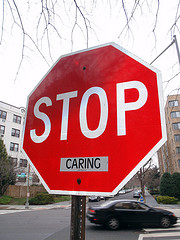On January 28, Mahalo CEO Jason Calacanis sent out an e-mail to his private mailing list titled “We Live in Public (and The End of Empathy).” The e-mail talked about the state of the internet as it relates to how people behave online and how accountable they are for those actions. There is a dehumanizing element to the internet that is fed by anonymity and the fact that you don’t have to see or face the people you are talking to, or about. Jason posted the e-mail on his personal site. I’d recommend reading it. If you are a community manager or moderator, parts of it – at least – will resonate with you.
Jason invited replies, so I decided to send him one, since I enjoyed the e-mail and found myself identifying with parts of it. I can’t share all of what I sent, but here are some of the more important thoughts.
What Jason talks about, I’ve certainly noticed, as well, and it does bother me. I’ve been managing online communities for nearly 10 years now and it’s something that I battle on a daily basis, so this really resonates with me. I’d like to think I’m “winning,” my communities are free of this type of thing. I could never run a community that worked like that. My communities are friendly, respectful and family/work friendly (for the most part). It takes work to get there, but that’s the environment that I want and that is my goal – that is the allure of the community. We welcome disagreement, but it must be respectful. We don’t allow anyone to call anyone names, to flame people, to beat people down, whether it be a member, myself, a staff member, Britney Spears – whoever.
I caught this part: “At some point, all humanity in an online community is lost, and the goal becomes to inflict as much psychological suffering as possible on another person.” I can say that, in my case, that hasn’t happened on my communities. That’s what I prevent. Funnily, that is one of the reasons I wrote the book, to give a blueprint on how to create a respectful community. Community managers, like myself, don’t have to settle for this sort of stuff, just because there are people out there who want to inflict it and people out there who cry foul when you stop them from doing it. You can stand up and you can protect your community. The problem is that it takes work and not everyone wants to do that. In some circles, it’s also not cool. It’s “censorship.” But, I don’t care.
I had a guy recently come to one of my forums and as his first post, I think, he posted and said that everyone else that had replied to the thread was a “clown.” Not in the funny way, but basically he said, “you shouldn’t take the advice of any of these clowns.” We removed his post and he replied to a member of my staff that the removal of that post reminded him of 1939 Germany. Ah ha, Godwin’s law! Yes, this comparison has happened many times. I’m used to it. I’ve been called every name there is. I’ve written about it some.
But, just because that happens doesn’t mean it needs to be that way. I would like to believe there is room for people like myself, who are cultivating communities with this in mind. Part of the problem is what Jason says – the mentality where people want to get as many pageviews, unique visitors, friends, followers, etc. as they can. For this reason, a lot of people don’t want to offend the users they have, so they let people do whatever they want. Sometimes they pass it off as “well, this is what my user’s want.” They take the traffic, they cash the check, but in the process, they create a community of trolls.
I was on the phone a couple of weeks ago with two people from a major corporation and I was giving them some feedback on an internal community they have going on and I told them that one of the luxuries I have is that I own my sites, I am my own boss – no one tells me anything. I don’t have to worry about someone above me that I have to please with numbers – someone that needs to see that the community has X number of posts, members, etc. to justify it. Results are good, but sometimes to get those results, to please your boss, you sell out the would be soul of your community and that’s sad.
Those aren’t my values and I’ll never run a community where that is OK. I would like to think this is not the majority – that what we hear in these IAS comments is the loud shouting of the minority. I hope so.

